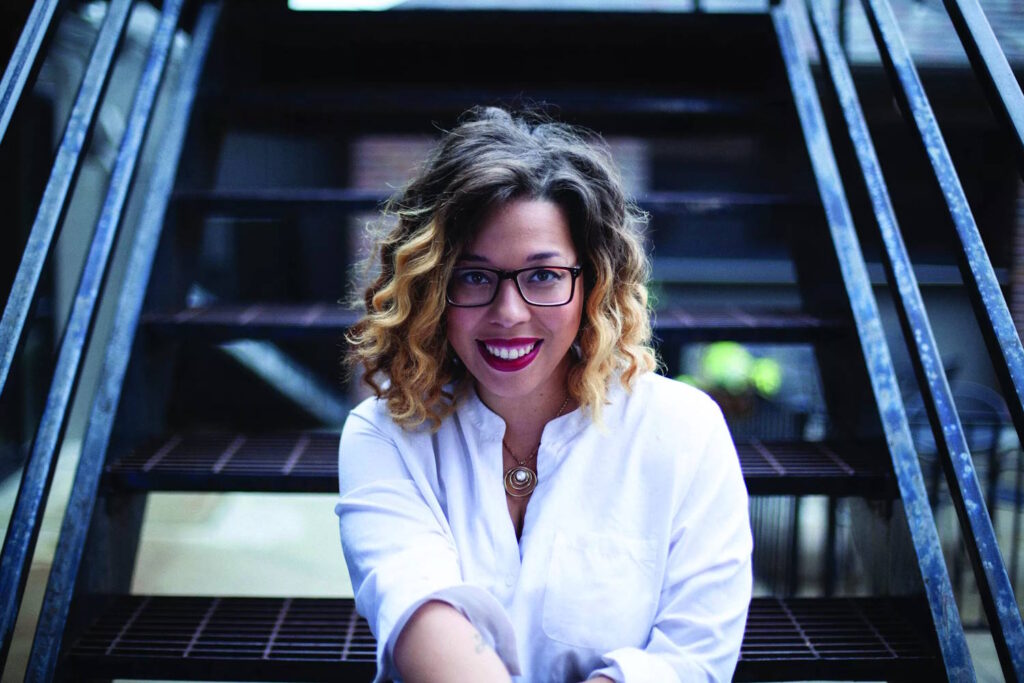“We all have stories to share, and the accessibility of creating live art, storytelling, the act of theater lives in all of us.”
-Beaufield Berry
Beaufield Berry is many things: playwright, screenwriter, mom, teacher, and novelist. Above all, Beaufield is a teller of stories and a playwright you should know. Her play IN THE UPPER ROOM follows an intergenerational African American family living under one roof and is based on the true stories of her family. Read on to hear the chilling experience of writing IN THE UPPER ROOM, her experiences in transformational theatre, and the advice Beaufield has for artists who are struggling to feel seen (she’s been there, too.)
KATIE STOTTLEMIRE: IN THE UPPER ROOM is based on your own life. The characters even share your last name, Berry. What was the process like of writing such an emotionally intense play based on your own experiences?
BEAUFIELD BERRY: Technically the play predates me. It involves the lives of my family, though! My mother inspired Josephine, John and Jan are my grandparents, Eddie is my beloved great grandfather who helped raise me, and Rose is the great grandmother who passed before I was born. The original process of writing was lightning quick. It was supernatural for me. I wrote late at night and their voices were so alive in me that I swore they were in the room. They wanted their (our) story shared and told; I wrote 100 pages in three nights. It has been emotional. It’s been emotional to see my mother’s reaction to seeing her younger self alive again. It’s also been affirming as I hear the feedback from the people who LIVED it, who ask me how I got it so accurate. And then I know that the experience of co-writing it with my ancestors was real.

KS: For me, the most fascinating and memorable characters are often complicated women, especially when they are contrasted with other complicated women. This play has a handful of complicated women, from the controlling, unrelenting matriarch of the family to her grandchildren navigating the pressures of being young women while dealing with colorism both inside and outside the home. What did you learn from translating these characters from the page to the stage?
BEAUFIELD: Wow, I love complicated women too. I love watching the generational divide that happens in a family of strong women play out. I learned that these are the women that I’m from and that in sharing our experiences honestly and with raw intention, we can help others do the same. Women are the ones who keep families alive, who sacrifice daily, who rise above everything thrown at them. It made me so proud to be a Berry woman and to remember where I came from.

KS: I read in another interview that after you had written IN THE UPPER ROOM, you were building a website to sell Halloween costumes because you had nearly given up on writing. This might be a feeling that many creatives can relate to. What did you learn about yourself during that time, and what advice would you give others who are experiencing a similar situation?
BEAUFIELD: Hahahahahaha. YES! I was on the phone with someone in China when I got the call from DCPA, which kind of pulled me off the ledge. I was living in the Midwest, so nowhere beneficial to building a writing career, I was a mom of 2 at the time, buried in domestic duties and with no real direction–just my dreams –but those felt on hold indefinitely. And then that call came and changed everything. And I think the biggest lesson is to just keep working, keep writing, keep sending, keep sharing. I had no idea that Heather Helinsky (dramaturg) had submitted my work. I had no idea anyone was reading it. I had no idea my name was in rooms I didn’t know yet. I know it’s a cliche, but you really have to keep pushing yourself forward and getting out of bed and even if I did end up selling Halloween costumes, I would still be writing because, at the end of the day, that is my purpose.
KS: Theatre can be a transformational experience for many people, from an audience submerged in a story, to those who have been working on said story since its first inkling of a concept. What’s your take on the transformational nature of theatre?
BEAUFIELD: When people say “theater saves lives” …I know it can sound so dramatic…but oh man, is it true. It saved mine from the confines of domesticity. Yes, I have to clean and cook and raise children, but I have a place I can go to lay my dreams down, and then other people pick them up so they can leave their confines and live their dreams too. That connects us. And it saves forgotten lives and untold stories from the abyss of obscurity. Theater is an incredibly powerful and needed art form, LIFE form, and anyone can do it. We all have stories to share, and the accessibility of creating live art, storytelling, the act of theater lives in all of us.

Article by Katie Stottlemire
